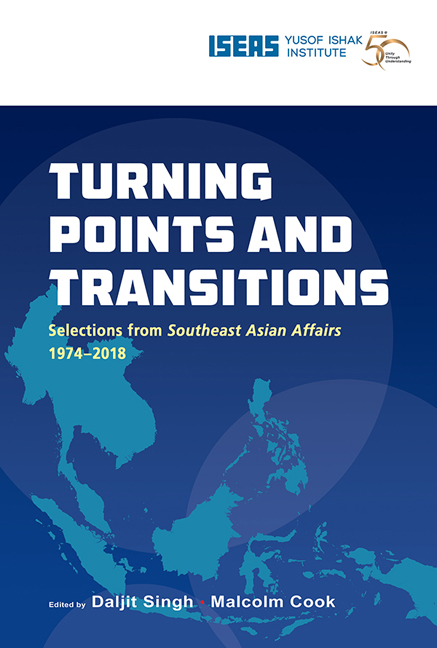Book contents
- Frontmatter
- Contents
- Message from the Director
- Foreword
- Foreword
- Introduction
- THE REGION
- BRUNEI
- CAMBODIA
- INDONESIA
- LAOS
- MALAYSIA
- The Security “Gap” in Peninsula Malaysia (1976)
- The ‘Battle Royal’ – The UMNO Elections of 1987 (1988)
- Malaysia: A Fateful September (1999)
- Tears and Fears: Tun Mahathir's Last Hurrah (2004)
- Malaysia: Political Transformation and Intrigue in an Election Year (2009)
- MYANMAR
- THE PHILIPPINES
- SINGAPORE
- THAILAND
- VIETNAM
Malaysia: Political Transformation and Intrigue in an Election Year (2009)
from MALAYSIA
Published online by Cambridge University Press: 29 May 2019
- Frontmatter
- Contents
- Message from the Director
- Foreword
- Foreword
- Introduction
- THE REGION
- BRUNEI
- CAMBODIA
- INDONESIA
- LAOS
- MALAYSIA
- The Security “Gap” in Peninsula Malaysia (1976)
- The ‘Battle Royal’ – The UMNO Elections of 1987 (1988)
- Malaysia: A Fateful September (1999)
- Tears and Fears: Tun Mahathir's Last Hurrah (2004)
- Malaysia: Political Transformation and Intrigue in an Election Year (2009)
- MYANMAR
- THE PHILIPPINES
- SINGAPORE
- THAILAND
- VIETNAM
Summary
The year 2008 will be remembered as a watershed for the Malaysian political system and for the forward trajectory of Malaysian democracy. This election year saw a refurbished coalition of oppositional political forces, the People's Pact (Pakatan Rakyat), deprive the ruling National Front (Barisan Nasional) coalition of its twothirds majority of seats in Parliament. Even more significantly, four state governments fell, making it a total of five governments in Opposition hands. I suggest here that this development has created a de facto two-party system for a maturing Malaysian democracy. Economically, Malaysians will be facing a severe downturn though not a technical recession. The year also saw the denouement of a leadership crisis within the United Malays National Organisation (UMNO) leading ultimately to the anticipated departure from the political stage in March 2009 of the fifth Malaysian Prime Minister Abdullah Ahmad Badawi. The political terrain remains fraught with pitfalls for premier-in-waiting Najib Abdul Razak and for Opposition Leader, Anwar Ibrahim, who awaits his sodomy trial.
The Malaysian Prime Minister Abdullah Badawi already had more than his fair share of a baggage of problems to deal with even before his tenure headed into 2008. Let me briefly recollect. After 25 November 2007, five HINDRAF lawyers remained in detention under the draconian ISA, while one was at large. The V.K. Lingam video exposé in September 2007 and the Royal Commission inquiry into it in January 2008 remained much in the public consciousness, so too the Altantuya murder trial which had dragged on from 2007. Inter-faith fractures which had surfaced since 2005 remained largely unresolved and so too internal squabbles within the ruling coalition parties. Most sensationally, the MCA Minister for Health had to resign because of the circulation of a sex video by his detractors. Finally, the economy was not in great shape with petrol prices and inflation spiking and Mahathir still sniping from the sidelines. Yet speculation was rife by early 2008 that an early election would be called presumably to salvage the premier's beleaguered situation, more than one year in advance of the mandatory five years. In a CNN interview Abdullah did admit that a fresh mandate was necessary for him to address a host of new issues and to make good his unfulfilled anti-corruption agenda.
- Type
- Chapter
- Information
- Turning Points and TransitionsSelections from Southeast Asian Affairs 1974-2018, pp. 460 - 474Publisher: ISEAS–Yusof Ishak InstitutePrint publication year: 2018



